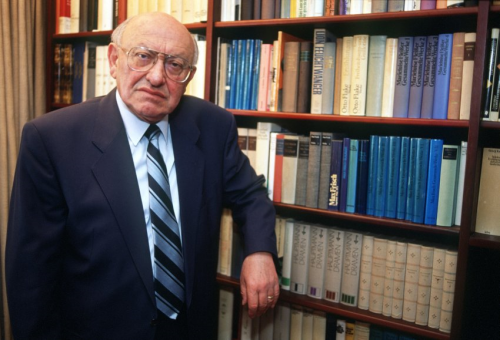Marcel Reich-Ranicki

Marcel Reich-Ranicki
Marcel Reich, later Reich- Ranicki was born on the 2 June 1920 in Wloclawek on the Vistula, the third child of the Polish Jew, David Reich and his German Jewish wife, Helene, nee Auerbach. David Reich established a small factory shortly after the First World War for building materials. But the firm went bankrupt, like so many others in 1929, and the family moved to Berlin, where Helene had relatives. One of Marcel’s teachers at the German speaking primary school in Wloclawek said to Marcel, ‘You are going into the country of culture.’
In Berlin Marcel went to the Werner Siemens School, and then attended a Secondary School in Willmersdorf, but he was not allowed to continue his studies because of his Jewish origin. Marcel Reich began a commercial apprenticeship for the export firm of Juan Casparius in Charlottenberg, a suburb of Berlin, but his apprenticeship was cut short on the 28 October 1938 when the family were deported by the Nazis to Poland.
His family settled in Warsaw, Marcel Reich worked for the Warsaw Jewish Council as a translator, and he helped translate the German orders that started the mass deportation from the Warsaw ghetto, to the death camp at Treblinka. He married Teofila (Tosia) formerly Langnas on the 22 July 1942, the very day the mass deportations commenced, and shortly afterwards the Judenrat Chairman Adam Czneriakow committed suicide. Marcel’s parents were deported to the Treblinka death camp where they were gassed, Marcel and his wife managed to escape from the Warsaw ghetto on the 3 February 1943 and was hidden by a Polish typesetter called Bolch and his wife, in a suburb of Warsaw on the right side of the Vistula River. Alexander Herbert Reich, his elder brother by 9 years was murdered by the Nazis on the 4 November 1943 in the Jewish labour camp at Poniatowa during the ‘Aktion Erntefest’ massacre.
After Marcel Reich and his wife were liberated by the Soviets, he joined the Polish Army working in the postal service censorship department and he rose to become head of this department. In 1946 he joined the Polish Military in Berlin and he served in the Foreign Intelligence Secret Service, and took the alias Ranicki. As Poland’s vice-consul he came to London in 1948, and he took the name Reich- Ranicki, as he thought that was more appropriate than Reich. On the 30 December 1948 his son Andrzej (Andrew) was born.
At the end of 1949, he returned to Warsaw, was dismissed from the Communist Party and jailed for several weeks in prison. Following his release from prison he worked as a lecturer in a Warsaw publishing house. He worked as a freelance writer and in 1958 he relocated to Frankfurt – am – Main in the Federal Republic of West Germany, working as a literary critic for ‘Die Zeit.’
Marcel Reich – Ranicki in 1969 became a professor of German literature of the 20th Century in a number of American universities and then in Sweden and Germany. In 1973 he returned to Frankfurt where he worked as the editorial of Literature and literary life in the Frankfurter Allgemeine Zeitung. In 1988 under his aegis ‘The Literary Quartet’ was founded and its broadcasts on the German Television channel ZDF thrust him into the media spotlight.
In 1999 he published his autobiography ‘My Life’ which became a bestseller, and was made into a film. In February 2006 he received an honorary degree from the Tel Aviv University. In February 2007 the Humboldt University in Berlin awarded him an honorary degree – this was ironic as this was the same university that turned down his application in 1938, due to his Jewish ancestry. In October 2008 he was awarded a lifetime achievement award for the Literary Quartet, which he refused, criticising the state of German television.
Marcel Reich – Ranicki died on 18 September 2013 in Frankfurt am Main, his wife Teofila (Tosia) passed away in 2011.
Sources
www. literaturekritik.de – Biography
The Guardian Newspaper
Photograph - Die Spiegel
© Holocaust Historical Society 2018

